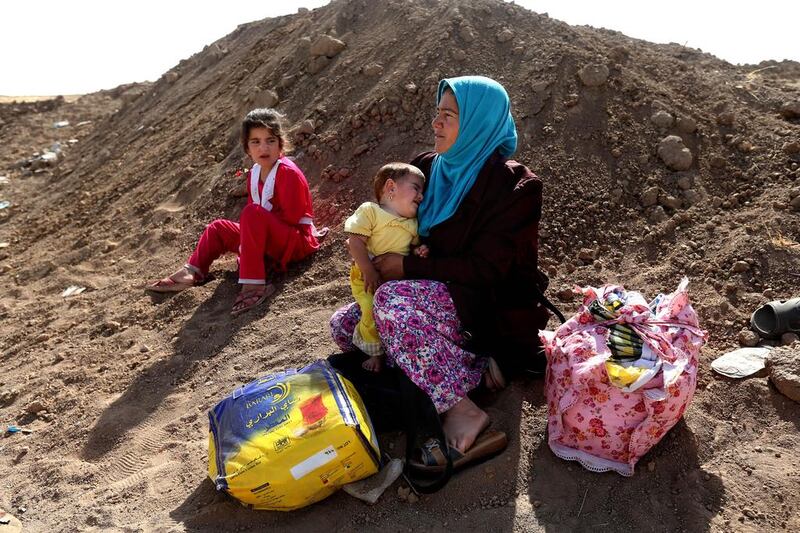BEIRUT // Syrian warplanes have attacked Islamic State in Iraq and Levant fighters at a border crossing with Iraq, Iraqi prime minister Nouri Al Maliki confirmed yesterday.
There were conflicting claims about whether the attack took place on Iraqi soil.
But the incident is a further sign that Mr Al Maliki’s Shiite allies – Iran and the regime of Syrian president Bashar Al Assad – are being drawn into the battle against Iraq’s Sunni insurgency led by the ISIL militants.
Mr Al Maliki also announced that efforts would be made to form a new government after talks with Britain’s foreign secretary, William Hague.
Mr Hague visited Baghdad to persuade Iraqi leaders to unite against the threat of a full-blown sectarian war. His visit was part of a wider diplomatic effort to address the conflict in Iraq before it affects the wider region.
In Paris, US secretary of state John Kerry met the foreign ministers of the UAE, Saudi Arabia and Jordan to discuss how to resolve the crisis sparked by the ISIL offensive.
“The move of ISIL concerns every single country here,” he said.
Calls have mounted for Mr Al Maliki to step aside or form an emergency coalition that is more inclusive of Iraq’s religions and ethnicities.
Sunni resentment, in particular, against Mr Al Maliki’s Shiite government has fed an offensive by ISIL militants, tribal forces and former members of Saddam Hussein’s Baath party that has wrested large chunks of territory from Baghdad’s control.
Mr Al Maliki confirmed the Syrian airstrike on ISIL militants to the BBC, saying it took place on the Syrian side of the border but without coordination with his government.
“Yes, Syrian jets did strike Qaim inside the Syrian side of the border,” he said. ISIL militants captured the town last Friday.
The group has virtually erased much of Iraq’s border with Syria.
ISIL is seeking to establish an Islamic caliphate straddling the border.
“There was no coordination involved,” Mr Maliki said. “But we welcome this action.
“They carry out their strikes and we carry out ours, and the final winners are our two countries.”
US officials had said the attack, which occurred on Tuesday, struck the Iraqi side of the border.
Mr Al Maliki said Iraq had bought used Sukhoi fighter jets from Russia and Belarus to battle the Islamist militants because US delays in delivering F-16 fighters had left its troops without air support.
US military advisers arrived in the country on Wednesday, although the US president, Barack Obama, has ruled out direct military involvement in Iraq.
Washington’s arch enemy in the region, Iran, is reported to have started supplying Baghdad with weapons such as rockets and machine guns.
The head of the Iranian Revolutionary Guard’s Quds Force, Qassem Soleimani, visited Baghdad this month in another sign of Iraq’s increasing coordination with Tehran and Damascus, which has also lost large tracts of territory to ISIL militants.
Iraq’s armed forces have struggled to combat the ISIL-led campaign that began with a lightning takeover of Mosul on June 10.
An offshoot of Al Qaeda, ISIL militants have gone on to capture predominantly Sunni areas, including three oilfields about 30 kilometres east of Tikrit on Wednesday .
Iraqi officials said security forces launched a helicopter-borne assault in Tikrit on Thursday, seizing control of its strategically located university. ISIL captured the town on June 11.
There has been increasing international pressure on Mr Al Maliki to form a unity government to handle the crisis, which has dramatically raised tensions between Sunnis and the Shiite majority.
He faces similar calls from leading Shiite figures in Iraq.
On Wednesday, Muqtada Al Sadr, a powerful imam, called for a national unity government of “new faces” that represents all groups.
In the meeting with Mr Hague yesterday, Mr Al Maliki struck a conciliatory tone by saying the crisis required political reconciliation as well as military efforts.
“We should proceed in two parallel tracks,” he said.
“The first one is work on the ground and military operations against terrorists and their gatherings.
“The second one is following up on the political process and holding a meeting of the parliament [on time] and electing a head of parliament and a president and forming the government.”
Iraq’s vice president, Khudeir al Khuzaie, issued a decree on Thursday ordering the 328-member parliament to convene on Tuesday to begin the process of forming a new government.
Despite winning the most seats in the April 30 elections, Mr Al Maliki’s political bloc needs backing from other parliamentary groups to form a governing coalition.
* With reporting by Reuters, Associated Press and Agence France-Presse





